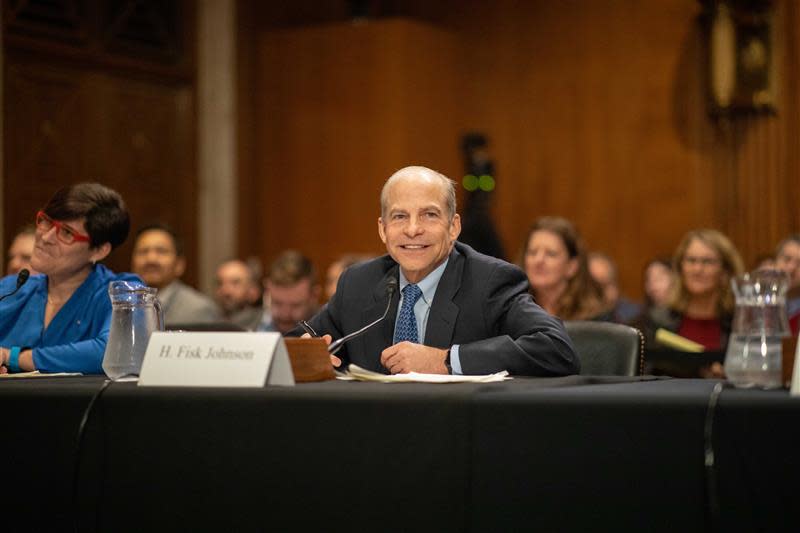SC Johnson CEO Fisk Johnson testifies at Senate hearing on recycling plastic, EPR
Fisk Johnson is no stranger in Washington, D.C., particularly when it comes to an issue he cares deeply about – plastic waste.
For years Johnson, CEO of Racine-based SC Johnson, has been pushing lawmakers to pass legislation to enhance the United States' ability to recycle and reuse plastic, particularly among businesses.
Johnson has used his own company as an example of what could be done to reduce the amount of plastic that ends up in landfills or large bodies of water. SC Johnson, a chemical cleaning company, sells bottles made from 100% recycled plastic and also sells cleaning solution cartridges that allow bottles to be reused with one squirt and water added.
But Johnson doesn't feel like these actions are having a significant impact.
"While we have made progress with our company's overall work on sustainability, for all of our company's work and ambition on plastic, I can't raise my hand and say I feel good about the progress that we made," Johnson said on Wednesday.
"Few of our product innovations have sold very well. Plastic waste is just not top of mind enough for most people to want to go to the minor inconvenience or pay a few cents more for the refill/re-use options we have offered."

Johnson testified before the U.S. Senate Committee on Environment and Public Works to advocate for stronger and uniform regulation on plastic and extended producer responsibility - known as EPR - because "voluntary actions only can go so far."
"In our view, the only practical way to get every stakeholder in the plastic ecosystem working collectively together and drive scale is a government regulatory framework," Johnson told the committee. "All companies of sufficient size in the ecosystem have to be a part of it for it to work and to drive the right economics and change."
More: Watch the hearing here
Also testifying before the panel was Erin Simon, the vice president of plastic waste and business for the World Wildlife Fund, and Dan Felton, the executive director of AMERIPEN, a packaging policy advocacy group.
Johnson has met with politicians and staff of both Republicans and Democrats to advocate for better regulation.
At the hearing, witnesses advocated for a fee to help improve, sustain and upgrade America's recycling system. Johnson was asked about putting a fee in place based on a company's "end of life" for the plastic product. That would mean that companies producing plastic that ends up in landfills would pay higher fees than companies that have the plastic recycled.
More: After visiting exhibit, Racine officials look to change plastic recycling policies
"I think it's a good incentive system for companies like ourselves to make our products more recyclable, to improve our PCR (post consumer recycled) content, and just have continuous improvement in the system," Johnson said. "A number of EPR schemes don't have that but we would certainly promote having that kind of system in EPR."
Johnson responds to questions
Sen. Shelly More Capito, R-West Virginia, vice chair of the committee, said it was difficult to get even "small recycling bills" though Congress.
"So how in the world are we able to do something on a federal level at the scale of which we're talking about?" Capito said, adding she does think it could be beneficial for people in all the states.
Capito expressed concerns about how such policies could impact the costs of products and the access rural communities have to recycling.
She also asked how individual states that have implemented EPR legislation have had an impact on business.
More: Environmentalists praise SC Johnson CEO's call for more plastics regulation
Johnson responded that there is "some conflict between the state laws."
"I'll give you an example: the labeling laws is part of EPR in California, it will prevent the chasing arrows symbol in most cases. Whereas 30 other states have laws that mandate the chasing arrows," Johnson said, referring to recycling symbols on plastic bottles.
"And our products flow pretty freely across state borders, so it would be impossible for us to comply with the law when you have that kind of labeling conflict."
Capito said Johnson's example is a reason why "harmonization would really be where we need to go here."
Sen. Pete Ricketts, R-Nebraska, asked if more regulations would drive up the cost of goods, especially for low-income communities.
"If we let this emerging round of state regulation happen, that's going to drive cost a lot faster than if we had federal regulation," Johnson replied. "The sooner we get federal regulation and the more time given to meet goals, the more innovation can happen, the more you get economies of scale and you can mitigate the cost and inconvenience to the people that buy our products. I advocate for time to meet these hurdles."
Johnson said innovation is happening on the recyclability of products.
"What we would like to see is harmonization of product labeling, product characteristics ... our product flows freely across state borders so that we don't have conflicts of laws and we can capture good economies of scale," Johnson said.
"To me those are the two most important things that we need from a federal level. but states obviously should have a lot of capability to design these systems to meet their state's particular needs."
This article originally appeared on Milwaukee Journal Sentinel: SC Johnson CEO testifies at Senate hearing on recycling plastic, EPR
